Julia Sanina has lived Eurovision from every angle – as a near-winner at Vidbir 2016, a juror in 2022, and a host on the stage in Liverpool. Now, as Julia’s band The Hardkiss prepare to release their most ambitious album yet, she opens up to Wiwibloggs’ Volodymyr Tsvyk about burnout, rebirth, and why Ukrainian music deserves to shine worldwide.
From Vidbir to Liverpool: Julia Sanina’s Eurovision journey
Julia Sanina’s connection with Eurovision goes back further than many realise. As a teenager, she vividly remembers watching the contest and imagining herself under those dazzling lights. “It felt like another universe,” she recalls. “A place where anything was possible – and one day I wanted to be there.”
That dream nearly came true at Vidbir 2016, when The Hardkiss were fan favourites to represent Ukraine. Their theatrical, high-concept performance won hearts, but in the end, they finished second to Jamala’s now-iconic “1944”.
Julia admits it was both painful and empowering: “It was a powerful lesson – something that still resonates with me today. I realised how much this stage means, and how much effort it takes to be fully ready for it.”
Six years later, Julia was back – this time as a juror at Vidbir 2022. The switch from stage to judges’ table wasn’t easy. “Of course, I remembered myself on that stage,” she says. “When you see an artist put everything into those three minutes, you know exactly how fragile and important that moment is. That memory made me more empathetic, but also more demanding.”
And then came the milestone of a lifetime: Liverpool 2023. Julia joined Alesha Dixon, Hannah Waddingham and Graham Norton to host the Eurovision Song Contest for an audience of over 160 million. The scale was breathtaking, and so was the responsibility. “The responsibility was enormous,” Julia reflects. “I wasn’t just standing there as Julia Sanina. I was representing Ukraine, our people, our music – in the middle of a war. It felt like carrying the voice of a whole nation.”
She remembers the adrenaline of that first broadcast. “When you hear that countdown in your ear, you realise the whole world is watching. You take a breath and just dive in. And somehow – it feels natural. I tried to stay true to myself, to smile, to breathe, to show Europe the real me.”
For fans across the continent, it reflected the resilience of a nation that keeps creating even in the darkest times.
By the time she returned home to host the Ukrainian national final in 2024, Sanina had experienced Eurovision from every angle – as a contestant, juror, and as an international and local presenter. That gave her a unique philosophy of the contest: “Eurovision is not just a competition,” she says. “For artists, it’s a chance to test themselves. For the audience, it’s a mirror of Europe – our pain, our joy, our hope. That’s why it matters so much.”
More than three minutes: Julia Sanina on the meaning of Eurovision
Experiencing Eurovision from three different roles gave Julia Sanina a perspective that few artists ever accomplish. For her, each step brought her closer to the core of the contest. “When you’re competing, it feels like your whole world depends on those three minutes. As a juror, you suddenly see how much potential and fragility are standing in front of you. And as a host… you feel the scale of Europe watching together,” she explains.
That shift also came with self-reflection. Julia admits that the deeper she went into the Eurovision universe, the more she realised it was bigger than individual ambitions. “It’s not just about winning or losing,” she says. “It’s about showing who you are and what your country is. It’s a mirror of our continent, with all its contrasts.”
So does she still see herself as a future contestant? Julia smiles at the question.
The Hardkiss have repeatedly said they are not planning to return to Vidbir, yet fans never stop speculating. “For the band, we’ve already found our own way. Eurovision is not the only path to be heard,” she notes. But when it comes to a possible solo bid, she keeps the door slightly ajar: “You never know. Music is unpredictable – and so is life.”
The Hardkiss identity
After more than 15 years on stage, The Hardkiss remain one of Ukraine’s most distinctive bands – and Julia Sanina knows why. “Sometimes it’s hard not to repeat yourself when you’ve already released four full albums,” she admits. “But our DNA is still there – the drama, the drive, the emotional depth. That’s what makes The Hardkiss The Hardkiss.”
Part of that DNA is visual. The band has built a reputation for bold, cinematic performances where costumes, lights and symbolism hit as hard as the music itself. Julia sees it as more than decoration: “We try to show reality through metaphors. Sometimes it’s fire, sometimes it’s a mirror, sometimes it’s something cosmic. It’s always a reflection of our inner world.”
Language is another tool in their identity. Switching between Ukrainian and English allows the group to resonate with different audiences. “Writing in English opens doors internationally, but Ukrainian carries a special power – it’s raw, it’s ours. Both languages let us tell different sides of the same story.” Julia explains.
And while many artists see Eurovision as the ultimate ticket to global recognition, The Hardkiss chose their own path. “For us, Eurovision was never the only option,” Julia says. “We’ve built our audience step by step, through tours, albums, visuals. Of course, Eurovision can give you exposure – but success also comes when your art is true, and people feel it.”
Between chaos and beauty: The Hardkiss’ new era
Creating music during a full-scale war is never simple – and for The Hardkiss, it has become both a challenge and a lifeline. Julia admits the new material is darker and more vulnerable than anything they’ve done before. “Sometimes I feel emotional exhaustion, like hitting the bottom and needing to push back up,” she confesses. “But there’s always light at the end of the tunnel. I like to leave a beacon in every song – even if it’s just a hint of hope.”
The band’s upcoming album, planned for spring 2026, feels like a reset. Until then, we will hear at least four singles – two already released (“Crush” and “Tenderness”), a few more on the way, plus a surprise collaboration in autumn. For Julia, it’s not a repeat of past formulas but something instinctive and fresh. “These songs don’t feel forced. They feel like they’ve always existed – and we just found them.” she says.
Symbolism is at the very heart of this new Hardkiss era – and fans are already busy connecting the dots. In “Crush”, the burning match became an instant talking point: a fragile spark, easy to extinguish, yet powerful enough to set the whole world ablaze. For many listeners, it symbolised burnout, the feeling of burning too brightly, too fast. Alongside it stood the mysterious suitcase, untouched by flames, as if guarding a secret yet to be revealed. Julia hints that these aren’t one-off visuals: “The third video will continue the story. All three clips can be watched as one piece.”
The follow-up, “Tenderness”, shifts the stage from fire to cosmos. Here, the heroine stands on the edge of a star – facing emptiness, silence, and the weight of her own exhaustion. The landscape is both vast and claustrophobic, echoing that moment when you feel trapped with no way forward. But even in this void, a thread of hope runs through. “It’s about the microcosm of a person,” Julia explains. “We all face endless walls and obstacles. But even in burnout, there is a chance to break free.”
Visually, The Hardkiss lean into technology. Their latest clips are built with chroma key and computer graphics – but Julia is quick to stress the human touch. “Today, people think everything is made by AI. That’s why I always emphasise that our videos are hand-crafted by real artists. I’m not against AI – it’s a tool, it’s the future. But emotions matter most. If your work makes people feel, you’ve already won.”
For fans, this new chapter is unmistakably The Hardkiss – dramatic, symbolic, cinematic – but also something more intimate. It’s a portrait of a band navigating chaos and finding beauty in it.
A mission beyond music
For Julia Sanina, the mission goes beyond charts or stages – it’s about carrying Ukrainian music to the world. “We were born to create, and it would be a sin not to. If our songs help people emotionally, then it’s bigger than just self-expression.” she reflects.
Her dream? To see Ukrainian artists celebrated globally, the way actors from Ukraine are now shining in Hollywood – and to make The Hardkiss a name that audiences across Europe instantly recognise. “I want people anywhere in the world to say: yes, I know this band, and they are from Ukraine.” she adds.
What do you think about Julia Sanina’s Eurovision journey and The Hardkiss’ new era? Tell us below!
Additional reporting by Danyyl Naumets
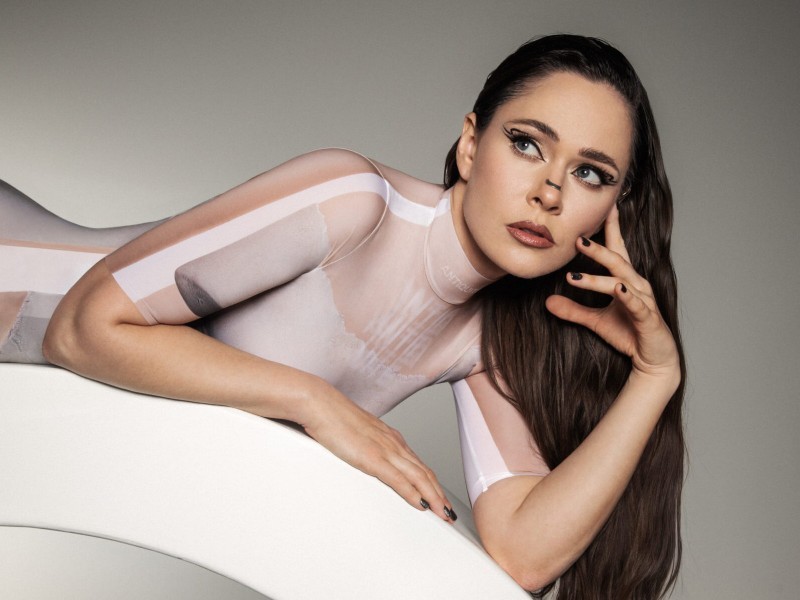

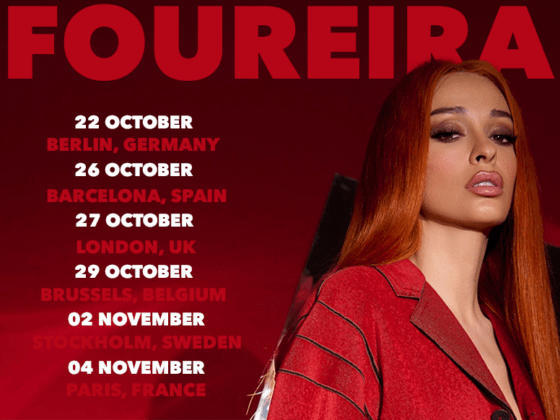



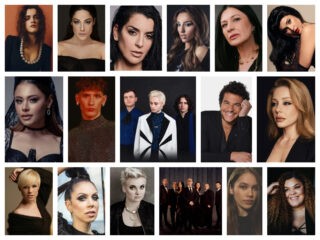

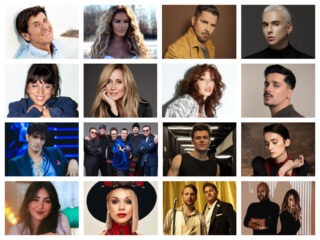
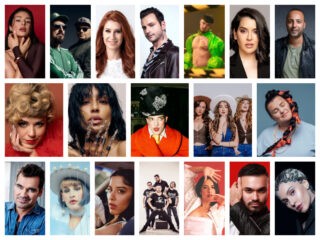
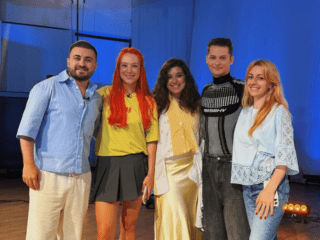
they are a pretty solid act, i have many of their songs in my playlist
The Hardkiss left Ukraine in 2022, so they can no longer be considered a Ukrainian band.
They’re my favourite band